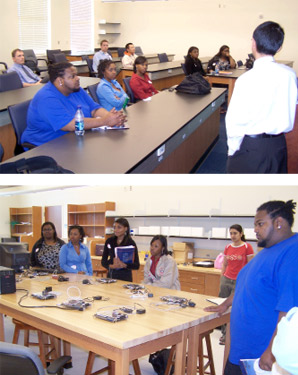Xiao Qin's Research
Final Report
BUD: A Buffer-Disk Architecture for Energy Conservation in Parallel Disk Systems
Training and Development
Student Support
This project has directly supported about 8 students including 4 graduate students and and 4 undergraduate students. The project also indirectly contributed to approximately 65 undergraduate students.
The BUD project has directly supported about 30 students and indirectly contributed to approximately 100 students. We developed a Java-based disk simulator to evaluate our proposed energy conservation techniques for disks.

We developed a graduate level class - COMP7970 Storage Systems – to train graduate students to implement disk simulators and conduct research in the realm of storage systems. The following table summaries the evaluation of this training class.
Rating system: 5- Agree Strongly 4-Agree 3-Unsure 2-Disagree 1-Disagree strongly 0-Not applicable
| I have learnt the following concepts and techniques: | Max | Min | Average |
| Energy-efficient storage systems | 5 | 4 | 4.6 |
| Dynamic power management | 5 | 3 | 4.6 |
| Design of low-power devices | 5 | 0 | 3.5 |
| Disk simulations | 5 | 2 | 4.1 |
| Reliable storage systems | 5 | 3 | 4.2 |
| Disk arrays | 5 | 4 | 4.4 |
| I/O-aware load balancing | 5 | 4 | 4.4 |
| BUD: Energy-efficient parallel disk systems with buffer disks | 5 | 4 | 4.6 |
| General Course Observations | |||
| I like this course | 5 | 4 | 4.8 |
| I will recommend this course to others | 5 | 4 | 4.8 |
The graduate students who took the training course were very satisfied with the material covered in the class. The students are very likely to recommend this class to other students in the department.
We developed a Java-based disk simulator to evaluate our proposed reliability models for energy-efficient storage systems.

We developed COMP7370 – Advanced Computer Security - for graduate students. This course was intended to give students a strong background in understanding design and development of secure systems in general and secure storage systems in particular.
The PI at Auburn educated graduate students to investigate the issues of energy efficiency and reliability in parallel disk systems. Graduate students also learnt how to use disk simulators to conduct research in the area of parallel disk systems. More than 93% of the students who took the storage systems class decided to recommend this class to other undergraduate and graduate students in the department of computer science and software engineering at Auburn University. All the students who took the class claimed that they like this type of research projects focusing on storage systems.
One of the major education objectives in this project is to recruit new undergraduate students, especially women and minorities, to conduct research in the area of storage systems and energy conservation technology in computer systems. To attract both the best undergraduate to participate in this project, in April 2008 we organized a workshop (see the following photo) that offered an opportunity for minority and women undergradate students to learn basic concepts in reliable and energy-efficient storge systems. In the long run, we plan to recuit monority students to conduct intensive research in fault-tolerant storage systems and reliability analysis with the PI. In this workshop, the PI emphasized new techniques and exciting findings of building mathematical reliability models and reducing energy dissipation in parallel disk systems.

A laboratory tour was held after the workshop. In the tour, the underrepresented students who participated in the workshop visited our new storage systems laboratory (see the photo on left). This workshop along with the laboratory tour aims to offer the undergraduate students an opportunity to gain first-hand experience in designing and implementing reliable and energy-efficient storage systems.
Research Experience for Undergraduate Students
To recruit new undergraduate students, especially women and minorities, to conduct research in the area of computer security, we designed a research program that offers ample opportunity to undergraduate students to do intensive research in information assurance with the PIs. In particular, students and the PIs are brought together to conduct research experiments in the field of secure and energy-efficient storage systems. The photo below shows two undergraduate students - Tsukasa Ogihara and Joshua Lewis - are building a cluster computing system using commodity-off-the-shelf (COTS) hardware components.

The cluster system (see the photo on right) built by our undergraduate research assistants will be used as a high-performance computing platform to support our computer security education. The cluster recently build in our department at Auburn supports security middleware services for secure software applications. We will use this cluster computing platform to design and implement study how to improve software applications’ quality-of-security without adversely affecting performance.
Advanced Computer Security for Graduate Students
We developed COMP7370 – Advanced Computer Security - for graduate students. This course was intended to give students a strong background in understanding design and development of secure systems in general and secure storage systems in particular.

The PI at Auburn educated graduate students to investigate the issues of energy efficiency and reliability in parallel disk systems. Graduate students also learnt how to use disk simulators to conduct research in the area of parallel disk systems. More than 93% of the students who took the storage systems class decided to recommend this class to other undergraduate and graduate students in the department of computer science and software engineering at Auburn University. All the students who took the class claimed that they like this type of research projects focusing on storage systems.
Contributions to Courses
This project has directly and indirectly contributed to the following classes:
COMP7970: Storage Systems
COMP4300: Computer Architecture
COMP4370: Computer and Network Security
COMP7370: Advance Computer and Network Security
CS696: Advanced Distributed Systems
CS325: Principles of Operating Systems
CS331: Computer Architecture
CS531: Advanced Computer Architecture